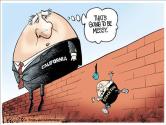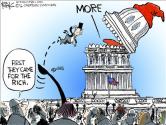We know that countries suffer when taxes get too high, in part because investors, entrepreneurs, and other successful taxpayers escape to jurisdiction with less oppressive fiscal regimes. France is a glaring example. On steroids.
We know that states also suffer when the tax burden becomes to onerous, leading to an exodus of jobs and investment. California andIllinois are case studies of this self-destructive practice.
California andIllinois are case studies of this self-destructive practice.
But it’s especially foolish for state governments to over-tax because it’s relatively easy to move from one state to another. Escaping a high-tax nation, by contrast, is a much costlier step and some governments impose quasi-totalitarian barriers to emigration.
Well, if states are foolish for imposing excessive taxation, then local governments that do the same thing are downright suicidal. It hardly requires any effort to move to another neighborhood on the other side of a city’s borders.
 That’s why Detroit was doomed to failure. It’s why California cities are going bankrupt. And it explains why I’m now very bearish about New York City.
That’s why Detroit was doomed to failure. It’s why California cities are going bankrupt. And it explains why I’m now very bearish about New York City.
Recommended
That’s because the voters of the Big Apple just voted for a Mayor who thinks class-warfare tax policy is the right approach.
That’s not going to end well. Here’s some of what I wrote for City AM, a newspaper that serves the London financial community.
The new mayor-elect Bill de Blasio has a tax-and-spend agenda reminiscent of the profligacy that led Greece to fiscal ruin. …It doesn’t take mass emigration to destabilise a local government’s finances, particularly when a city is very dependent on a limited number of high-income taxpayers. That is why de Blasio’s fiscal agenda is so risky. He wants to raise the New York City income tax (which comes on top of the 39.6 per cent federal income tax and the 8.8 per cent state income tax) from 3.876 per cent to 4.41 percent for taxpayers with an annual income over $500,000.
The Wall Street Crowd, however, doesn’t need to call the moving vans right away.
But there is some good news: New York City does not have full control of its fiscal affairs. Any changes in the local income tax or local sales tax have to be approved by the state. Democratic governor Andrew Cuomo reportedly has national ambitions, and has expressed scepticism about de Blasio’s planned tax hike. Further, Republicans control the state senate and presumably will not be overly sympathetic to any fiscal plan that pillages Wall Street. So folks in places that compete with New York City – such as London, Tokyo, and Hong Kong – shouldn’t put champagne on ice quite yet. Mayor-elect de Blasio wants to help your cities, but it’s uncertain at this stage whether he will succeed.
If you put a gun to my head, I suspect de Blasio will get some sort of tax hike, but probably not what he wants.
So what will that mean? It’s hard to answer that question without also know what will happen on the spending side of the budget. If he pays off his union supporters by augmenting the already excessive pay and benefits of city workers, then New York City will be on the fast track to fiscal trouble.
But if he “merely” gets a tax hike, then the City’s collapse will take longer. As I noted earlier this year, there are many people who are willing to swallow big tax bills to live in particular locations.
…it’s clear that some people are willing to pay more because they like the non-political features of NYC and the Golden State. For those who like museums, fancy dining, and Broadway shows, there’s no easy substitute for New York City. And for people who like the ocean and a Mediterranean climate, it’s hard to compete with California.
But there are limits. Each time the fiscal burden increases, a few more rich people may decide to leave. And since New York City is heavily dependent on upper-income taxpayers (the government already gets 43 percent of its income tax revenue from this sliver of the population), it doesn’t take much fiscal emigration to destabilize the City’s budget.
 Perhaps the most important lesson, though, is that higher taxes on the rich are simply the appetizer course. It’s just a matter of time before politicians go after the rest of us – for the simple reason that you can’t finance a welfare state without screwing the middle class.
Perhaps the most important lesson, though, is that higher taxes on the rich are simply the appetizer course. It’s just a matter of time before politicians go after the rest of us – for the simple reason that you can’t finance a welfare state without screwing the middle class.
P.S. If you want more class-warfare cartoons, clickhere, here, here, and here.


